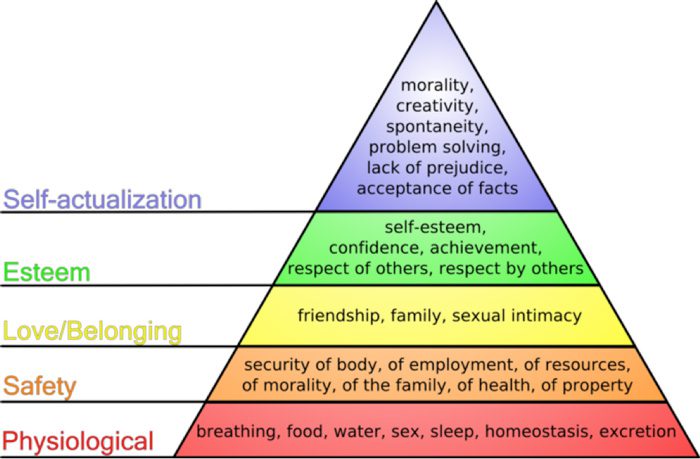Everyone at some point in their lives tries to figure out where they belong in society.
This yearning to belong to a social group is more than a mere desire; it is a need. In 1943, Abraham Maslow wrote and published “A Theory of Human Motivation” in Psychological Review. His theory was widely accepted and fully expressed in 1954, in his book Motivation and Personality. Maslow’s Hierarchy of Needs is often depicted within a pyramid:
According to Maslow, one must satisfy lower-level basic needs before progressing on to meeting higher-level growth needs, and the longer a need goes unmet, the stronger the desire will be to have that need fulfilled. As we can see, Love/Belonging (Social Acceptance) is third in the pyramid. The realization of this need begins at a young age. This is why children may imitate other’s behaviors, dress code, mannerisms, etc.—to fit into a social group.
The desire to fit in can also be an underlying cause of addiction.
Adolescence is the period where we move away from the safety net of our family, and seek ‘belonging’ in an outside group. How to interact in social situations is not something that is always taught at home. Lack of social skills and experience in social situations, overprotective parenting, and limited social judgment are some of the underlying causes for experiencing social anxiety.
It has long been known that individuals who suffer from addiction began using drugs/and or alcohol as a means of self-medicating. Many addiction problems begin during adolescence, when the search for where we belong in society begins. Young people often begin drinking or smoking marijuana as a means to fitting in with a group, or to alleviate feelings of anxiety in a group setting. The brain is wired to seek what makes us feel good. The longer a person uses substances or behaviors to alleviate feelings of anxiety from social situations, the more likely they are to become addicted. Extended use and higher dosages change the brain’s natural chemistry.
A study was conducted by a number of researchers at Wake Forest University School of Medicine.
The study was performed with four groups of monkeys. The researches took either a dominant or subordinate monkey and put it in a cage next to a group of unfamiliar monkeys. They could not hurt each other, but they could yell and scream, causing a stressful situation for the lone monkey.
After the stressful event, the monkeys were given a chance to relax. They were brought back to their own housing, where they were allowed to pull a lever that gave them food or a dose of cocaine. The subordinate monkeys gave themselves a lot more cocaine than they had before the stressful event, and the dominant monkeys gave themselves less. Brain scans were conducted during the event. The results showed that the dominant monkeys showed increased activation in the brain’s pleasure region, and the subordinate monkeys showed less activation in the stress and anxiety management regions. The socially dominant monkeys actually enjoyed the fight, while the socially inferior monkeys became stressed out, therefore dosing themselves with cocaine as a means to feel better.
Alcoholics Anonymous has long known the correlation between social acceptance and addiction.
Researchers have examined adolescents who attended AA to see how much they participated in the meeting and helped set up, make coffee, help organize, or clean up afterwards. What they found was that the participants who helped out at the meetings were less likely to relapse six months later. Participating in service activities helps individuals gain social confidence and give them a sense of belonging.
The bottom line is that all humans want to feel good. We all want to be loved and feel that we belong somewhere in this world. Gaining the tools necessary to overcome feelings of anxiety is the first step on the road to recovery.
Reference:
Jaffe, Adi. Ph.D. Psychology Today. “Social anxiety and drugs: A lesson in addiction from monkeys.” 03/05/10.

